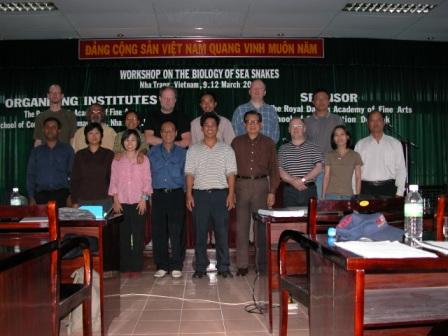The Sea Snake Workinggroup
RESOLUTIONS: THE NHA TRANG DECLARATION
Workshop on the Biology of Sea Snakes (elapids with a flat paddle-like tail), held at the Institute of Oceanography, Nha Trang, Vietnam, 9 to 12 March 2004, jointly organised by DANIDA Research Council, The Royal Danish Academy of Fine Arts, School of Conservation, and the Institute of Oceanography, Nha Trang.
The following scientists representing eight countries participated: Cambodia: Touch Seang Tana. Denmark: Jesper Norup Nielsen, Peter Gravlund, Jens Boedtker Rasmussen, Arne Redsted Rasmussen. Indonesia: Medy Ompi. Malaysia: Indraneil Das. Philippines: Filipina B. Sotto. Sri Lanka: Anslem de Silva. Thailand: Somchai Bussarawit, Lawan Chanhome, Visith Sitprija, Sansareeya Wangkulangkul. Vietnam: Chu Anh Khanh, Nguyen Thi My Ngan, Cao Van Nguyen.
It was agreed that:
1) Sea snakes contribute significantly to the biological diversity of marine, coastal and freshwater ecosystems of the Indo-Pacific region.
2) The natural habitats of sea snakes are rapidly being degraded through pollution, use by humans and their impact, and thus require immediate assessment. Appropriate management options may need to be adopted in order to stem the decline of sea snake populations as a result of habitat destruction.
3) Intensive fishing activities, especially the use of trawlers, result in the incidental capture of a large number of sea snakes, a large proportion of which perish. This is a senseless loss of a valuable biological resource, the ecological implications of which are not well understood at present.
4) Systematic knowledge of the group, in addition to knowledge of biology and conservation status, remains poor.
5) For effective species conservation, more research is needed on these and other aspects of the natural history of sea snakes and of their habitat requirements.
6) Efforts to enhance conservation of sea snakes should include: Institutional capacity building, training, especially of students, husbandry, development of databases on trade, and other forms of use, bites, a general exchange of information between sea snake workers and others interested in their management and conservation, a review of legislation, and finally a public awareness programme.
7) Many fishermen and some tourists get bitten by sea snakes every year throughout the region. A number of these bites result in death. Thus, the status of bites by sea snakes and preventive methods need to be ascertained.
8) Where bites from sea snakes are a problem, specific anti-venom needs to be developed where it is not currently available.
9) Sea snakes are a shared common resource. The migratory habits and wide distribution of some species make them ideal candidates for regional cooperation in studies of biology and conservation. Such cooperation between institutions and individuals, representing many countries of the Indo-Pacific region, has been ongoing for the past decade. These collaborative ventures need to be carried on in the future.
On behalf of the participants
Arne Redsted Rasmussen
The Royal Danish Academy of Fine Arts
School of Conservation
E-mail: ARR@KONS.DK

|